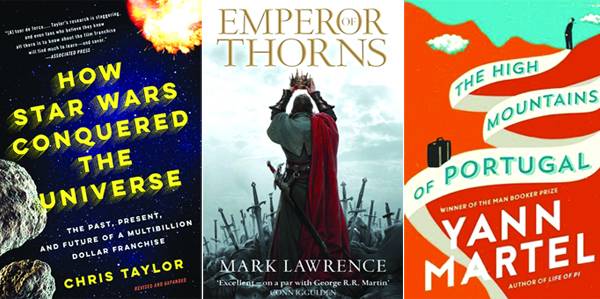
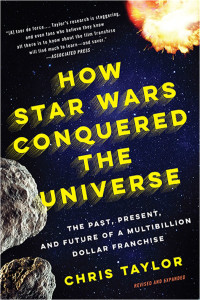
How Star Wars Conquered the Universe
Chris Taylor
Basic Books (paperback), 2015
PRs 1800
In 1973, a young filmmaker named George Lucas scribbled some notes for a far-fetched space-fantasy epic. Some forty years and $37 billion later, Star Wars–related products outnumber human beings, a growing stormtrooper army spans the globe, and “Jediism” has become a religion in its own right. Lucas’s creation has grown into far more than a cinematic classic; it is, quite simply, one of the most lucrative, influential, and interactive franchises of all time. Yet incredibly, until now the complete history of Star Wars—its influences and impact, the controversies it has spawned, its financial growth and long-term prospects—has never been told.
In How Star Wars Conquered the Universe, veteran journalist Chris Taylor traces the series from the difficult birth of the original film through its sequels, the franchise’s death and rebirth, the prequels, and the preparations for a new trilogy. Providing portraits of the friends, writers, artists, producers, and marketers who labored behind the scenes to turn Lucas’s idea into a legend, Taylor also jousts with modern-day Jedi, tinkers with droid builders, and gets inside Boba Fett’s helmet, all to find out how Star Wars has attracted and inspired so many fans for so long.
Since the first film’s release in 1977, Taylor shows, Star Wars has conquered our culture with a sense of lightness and exuberance, while remaining serious enough to influence politics in far-flung countries and spread a spirituality that appeals to religious groups and atheists alike. Controversial digital upgrades and poorly received prequels have actually made the franchise stronger than ever. Now, with a savvy new set of bosses holding the reins and Episode VII on the horizon, it looks like Star Wars is just getting started.
An energetic, fast-moving account of this creative and commercial phenomenon, How Star Wars Conquered the Universe explains how a young filmmaker’s fragile dream beat out a surprising number of rivals to gain a diehard, multigenerational fan base—and why it will be galvanizing our imaginations and minting money for generations to come.
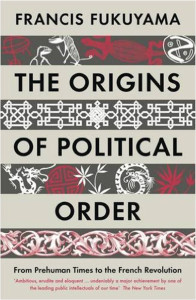
The Origins of Political Order
Francis Fukuyama
Farrar, Straus and Giroux (paperback), 2012
PRs 1595
Virtually all human societies were once organised tribally, yet over time most developed new political institutions which included a central state that could keep the peace and uniform laws that applied to all citizens. Some went on to create governments that were accountable to their constituents. We take these institutions for granted, but they are absent or are unable to perform in many of today’s developing countries?with often disastrous consequences for the rest of the world.
Francis Fukuyama, author of the bestselling The End of History and the Last Man and one of our most important political thinkers, provides a sweeping account of how today’s basic political institutions developed. The first of a major two-volume work, The Origins of Political Order begins with politics among our primate ancestors and follows the story through the emergence of tribal societies, the growth of the first modern state in China, the beginning of the rule of law in India and the Middle East, and the development of political accountability in Europe up until the eve of the French Revolution.
Drawing on a vast body of knowledge?history, evolutionary biology, archaeology, and economics?Fukuyama has produced a brilliant, provocative work that offers fresh insights on the origins of democratic societies and raises essential questions about the nature of politics and its discontents.
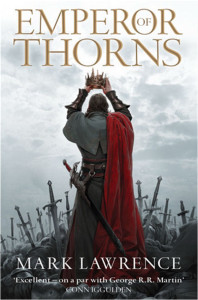
Emperor of Thorns
Mark Lawrence
Harper Voyager (paperback), 2014
PRs 900
The boy who would rule all may have finally met his match...
King Jorg Ancrath is twenty now—and king of seven nations. His goal—revenge against his father—has not yet been realised, and the demons that haunt him have only grown stronger. Yet no matter how tortured his path, he intends to take the next step in his upward climb.
Jorg would be emperor. It is a position not to be gained by the sword but rather by vote. And never in living memory has anyone secured a majority of the vote, leaving the Broken Empire long without a leader. Jorg plans to change that. He’s uncovered the lost technology of the land, and he won’t hesitate to use it.
But he soon finds an adversary standing in his way, a necromancer unlike any he has ever faced—a figure hated and feared even more than himself: the Dead King.
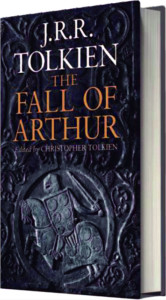
The Fall of Arthur
JRR Tokien
Harper Collins (hardcover), 2014
PRs 1900
The Fall of Arthur recounts in verse the last campaign of King Arthur, who, even as he stands at the threshold of Mirkwood, is summoned back to Britain by news of the treachery of Mordred. Already weakened in spirit by Guinevere’s infidelity with the now-exiled Lancelot, Arthur must rouse his knights to battle one last time against Mordred’s rebels and foreign mercenaries. Powerful, passionate, and filled with vivid imagery, this unfinished poem reveals Tolkien’s gift for storytelling at its brilliant best. Christopher Tolkien, editor, contributes three illuminating essays that explore the literary world of King Arthur, reveal the deeper meaning of the verses and the painstaking work his father applied to bring the poem to a finished form, and investigate the intriguing links between The Fall of Arthur and Tolkien’s Middle-earth.
Reviews
“An incomplete but highly compelling retelling . . . An action-packed, doom-haunted saga, full of vivid natural description.”—New York Times Book Review
“Compelling in pace, haunted by loss, it lives up to expectations.”—Daily Beast
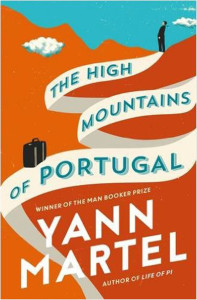
The High Mountains of Portugal
Yann Martel
Canongate (paperback), 2016
PRs 1195
In Lisbon in 1904, a young man named Tomás discovers an old journal. It hints at the existence of an extraordinary artifact that—if he can find it—would redefine history. Traveling in one of Europe’s earliest automobiles, he sets out in search of this strange treasure.
Thirty-five years later, a Portuguese pathologist devoted to the murder mysteries of Agatha Christie finds himself at the center of a mystery of his own and drawn into the consequences of Tomás’s quest.
Fifty years on, a Canadian senator takes refuge in his ancestral village in northern Portugal, grieving the loss of his beloved wife. But he arrives with an unusual companion: a chimpanzee. And there the century-old quest will come to an unexpected conclusion.
The High Mountains of Portugal—part quest, part ghost story, part contemporary fable—offers a haunting exploration of great love and great loss. Filled with tenderness, humor, and endless surprise, it takes the reader on a road trip through Portugal in the last century—and through the human soul.
Praise for The High Mountains of Portugal
“Just as ambitious, just as clever, just as existential and spiritual [as Life of Pi] . . . a book that rewards your attention . . . an excellent book club choice.”—San Francisco Chronicle
“There’s no denying the simple pleasures to be had in The High Mountains of Portugal.”—Chicago Tribune
“Charming . . . Most Martellian is the boundless capacity for parable. . . . Martel knows his strengths: passages about the chimpanzee and his owner brim irresistibly with affection and attentiveness.”—The New Yorker
“A rich and rewarding experience . . . [Martel] spins his magic thread of hope and despair, comedy and pathos.”—USA Today

